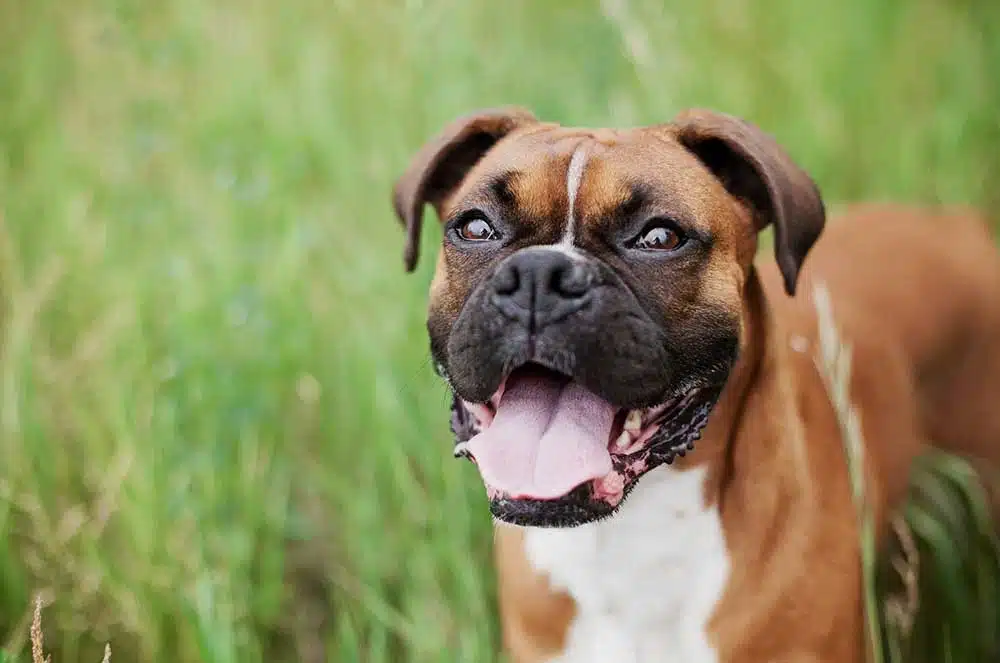
Anyone who is a dog lover knows how wonderful it is to snuggle your dog tight and show them as much affection as you possibly can. Subsequently, any Boxer pet owner knows that this type of love and affection isn’t an option; it’s a requirement! But what about those of us who love our dog but are severely allergic to dogs? Dog allergies are a real pain, but we are very lucky to live in a modern age where problems like being allergic to dogs have solutions. In this article, we will look into are Boxers hypoallergenic and discuss the potential options for dog lovers with dog allergies.
Are Boxers Hypoallergenic?
Unfortunately, the answer to the question of “are Boxers hypoallergenic?” comes with a very cut and dry “no.” Boxers, like most other dog breeds, have a fur coat that covers their skin. Boxers are referred to as a “short-hair,” meaning that the fur on a Boxer’s coat is short and coarse as opposed to the long and luscious mane of a Border Collie or Golden Retriever.
Short-haired dog breeds tend to be categorized as “allergy-friendly,” but this is not at all the same as being hypoallergenic. The phrase hypoallergenic refers to a substance that cannot elicit an allergic reaction due to the chemical composition of the material. In less technical terms, and in reference to dogs, this means that even someone who is allergic to dog fur can interact with a hypoallergenic dog without emitting an allergic reaction.
But how can this be? Is there even such a dog that is completely hypoallergenic? Fortunately for dog lovers with dog allergies, there are such things as hypoallergenic dogs, a Boxer is simply not one of them.
What makes a dog hypoallergenic?
To understand what makes a dog hypoallergenic, we must first understand what causes a dog allergy. Someone who is allergic to dogs is not allergic to the dog itself but rather from the dander that falls off of the dog. Dander is a combination of dead skin and dead fur that falls off your pet. Believe it or not, everything that has hair, feathers, or fur has dander.
For dogs, dander is an ongoing issue. The natural cycle of a dog’s skin and fur is to grow, die, and shed in preparation for new skin and fur. Obviously, this doesn’t happen in large quantities; rather, it is the growth of new cells, which is a type of regular cellular changeover that causes the release of dander to be constant.
Dander isn’t the only thing that humans can be allergic to. Allergies to dog saliva can also cause allergic symptoms like sneezing, itchy eyes, and even hives. While allergies to pet saliva are much more uncommon, these allergies are typically much more severe. Unfortunately for allergy burdened dog lovers, even those dogs that carry the proud label of being hypoallergenic can cause an allergic reaction because of saliva.
So if there is no such thing as a truly hypoallergenic dog, then why do some dogs get to be branded as hypoallergenic? The hypoallergenic aspect of allergy-friendly dogs stems from the notion that certain breeds produce far less dander. One such breed, touted for its hypoallergenic qualities, is the Poodle.
It was long purported that a poodle was hypoallergenic because it did not have fur, but rather a hair. This myth is not entirely true. A Poodle does, in fact, have fur, but a very specific type. The type of fur found on a poodle is the consistency and density of hair rather than fur and exists in a single layer, instead of the plush double layer found on most other dogs.
Thus, the consistency of poodle fur, along with other hypoallergenic dog breeds, is far more similar to human hair, and when it falls out, it does so in single strands rather than large bushy clumps. As a result, a Poodle sheds far less and creates far less dander than other normal dog breeds, like a Boxer.
Here are some of the breeds that have been labeled as hypoallergenic:
- Bedlington Terrier
- Bichon Frise
- Chinese Crested
- Irish Water Spaniel
- Kerry Blue Terrier
- Maltese
- Poodles (Toy, Miniature, and Standard)
- Portuguese Water Dog
- Schnauzers (Miniature, Standard, and Giant)
- Soft-Coated Wheaten Terrier
- Xoloitzcuintli
What are some hypoallergenic dog breeds that are like boxers?
As far as dogs go, there is not much that can compare with the incredible combination that a Boxer provides. There are so many Fun Facts About Boxer Dogs; They are loving but protective, they are high intensity, but they’re great with kids! Boxers have a very specific temperament, and as a result, it is hard to say that there is another dog similar enough to a boxer that is also hypoallergenic.
The good news about Boxers is this: while they are not hypoallergenic, they are allergy retardant. In other words, because a Boxer is of the short hair variety, even someone who is allergic to dogs could potentially be fine living with a boxer.
Dogs, just like humans, have a very specific genetic makeup and even dogs from the same litter, vary drastically with how much they shed. While Boxers as a breed tend to shed far less than other dogs, owning a Boxer as someone with a dog allergy would still be a roll of the dice.
Are there any crossbreeds that are hypoallergenic?
You may have heard them referred to as “designer dogs.” Hypoallergenic crossbreeds are the wave of the future, and they are allowing dog lovers with allergies to reclaim their love of canines! As of 2019, the most popular hypoallergenic crossbreeds were the Golden Doodle and the Labradoodle, both a mixture of a Standard Poodle.
The Golden Doodle is part Golden Retriever, and the Labradoodle is part Labrador. The amazing part about these designer dogs is that the hypoallergenic genes are dominant, meaning that the crossbreed by default is hypoallergenic as well! By crossbreeding the hypoallergenic nature of a Poodle with other dog breeds, there are new ways for dog lovers to have the dog of their dreams!
So Is there a Boxerdoodle!?
Yes! A Boxer/Poodle mix, aka the Boxerdoodle, is a real thing! This amazing Boxer mix is the most allergy-friendly version of a boxer you will find. Be aware though, each litter varies in size, color, and physical appearance, and you are definitely not getting a full-fledged Boxer.
What you potentially lose in classic Boxer looks, you will more than makeup for in the sweet Boxer temperament that remains as part of these wonderful hypoallergenic pets. The Boxerdoodle still looks very similar to the purebred Boxer, with some key differences. First, the Boxerdoodle is often much smaller in size than a normal Boxer. Boxerdoodles can range anywhere from 20-60 pounds, meaning, on average, they are about ⅔ as big as their purebred counterparts.
When dealing with designer dogs, the parents have a lot to do with how the pups will turn out, and even then there are no guarantees. The important thing is to rejoice at the fact that even Boxer lovers who suffer from severe dog allergies now have hope to find a Boxerdoodle to love.
When looking for a Boxerdoodle, always make sure to check your local animal shelters first. Even if there are no Boxerdoodles available in your area, there may be another hypoallergenic dog who you could give a home to. Additionally, the magic of the internet makes it easy to adopt dogs from all over the country. This means that even if you are dead set on a Boxerdoodle and no other dog breeds, you could find a rescue in the next state over!
While Boxers themselves may not be fully hypoallergenic, it is nice to know that there are options available for Boxer lovers who suffer from dog allergies. As far as being an irritant to allergies, Boxers do fall closer to the hypoallergenic side of things, but their dander can still produce a doozy of an allergic reaction.
Boxers are a wonderful breed with so much to offer, unfortunately being allergy-friendly is not one of those attributes. Luckily the Boxerdoodle is a real thing and offers a whole new world of possibilities for those with dog allergies to get their Boxer fix! Whether your next dog is a Boxer, a Boxerdoodle, or something completely different, it is important to ensure that they have a healthy and happy lifestyle. Boxers and Boxerdoodles, for that matter, need a healthy diet that is rich in the right fats, proteins, and the correct carbohydrates. Give your Boxer the best and ensure they are living their best life!
Link to: 7 Fun Facts About Boxer Dogs


Leave A Comment
You must be logged in to post a comment.